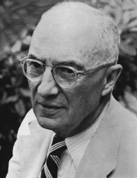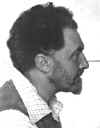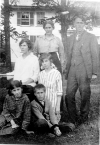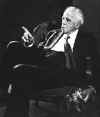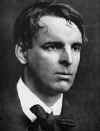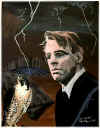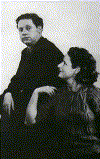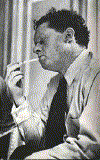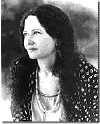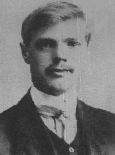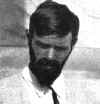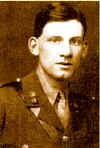![]()
In a Station of the Metro
by Ezra Pound — 1913
The apparition of these faces in the crowd;
Petals on a wet, black bough.
![]()
Calmly We Walk Through This April's Day
by Delmore Schwartz — 1937
Calmly we walk through this April's day,
Metropolitan poetry here and there,
In the park sit pauper and rentier,
The screaming children, the motor-car
Fugitive about us, running away,
Between the worker and the millionaire
Number provides all distances,
It is Nineteen Thirty-Seven now,
Many great dears are taken away,
What will become of you and me
(This is the school in which we learn . . .)
Besides the photo and the memory?
( . . . that time is the fire in which we burn.)
(This is the school in which we learn . . .)
What is the self amid this blaze?
What am I now that I was then
Which I shall suffer and act again,
The theodicy I wrote in my high school days
Restored all life from infancy,
The children shouting are bright as they run
(This is the school in which they learn . . .)
Ravished entirely in their passing play!
( . . . that time is the fire in which they burn.)
Avid its rush, that reeling blaze!
Where is my father and Eleanor?
Not where are they now, dead seven years,
But what they were then?
No more? No more?
From Nineteen-Fourteen to the present day,
Bert Spira and Rhoda consume, consume
Not where they are now (where are they now?)
But what they were then, both beautiful;
Each minute bursts in the burning room,
The great globe reels in the solar fire,
Spinning the trivial and unique away.
(How all things flash! How all things flare!)
What am I now that I was then?
May memory restore again and again
The smallest color of the smallest day:
Time is the school in which we learn,
Time is the fire in which we burn.


![]()
High Flight
by Jon Gillespie Magee, Jr.
Pilot Officer, RCAF — 1941
Oh, I have slipped the surly bonds of Earth
And danced the skies on laughter-silvered wings;
Sunward I've climbed, and joined the tumbling mirth
Of sun-split clouds - and done a hundred things
You have not dreamed of - wheeled and soared and swung
High in the sunlit silence; hov'ring there,
I've chased the shouting wind along, and flung
My eager craft through footless halls of air.
Up, Up the long, delirious, burning blue
I've topped the wind-swept heights with easy grace
Where never lark, or even eagle flew -
And, while with silent lifting mind I've trod
The high untrespassed sanctity of space,
Put out my hand and touched the face of God.
In December 1941, Pilot Officer John G. Magee, a nineteen year old American
serving with the Royal Canadian Air Force in England, was killed when his Spitfire
collided with another airplane inside a cloud. Several months before his death, he
composed his immortal sonnet "High Flight," a copy of which he mailed to
his mother in the United States.

Click for
larger image
![]()
Stopping by Woods on a Snowy Evening
by Robert Frost — 1923
Whose woods these are I think I know.
His house is in the village, though;
He will not see me stopping here
To watch his woods fill up with snow.
My little horse must think it queer
To stop without a farmhouse near
Between the woods and frozen lake
The darkest evening of the year.
He gives his harness bells a shake
To ask if there is some mistake.
The only other sound's the sweep
Of easy wind and downy flake.
The woods are lovely, dark, and deep,
But I have promises to keep,
And miles to go before I sleep,
And miles to go before I sleep.

Nothing Gold Can Stay
by Robert Frost —
Nature's first green is gold,
Her hardest hue to hold,
Her early leaf's a flower;
But only for an hour.
Then leaf subsides to leaf,
So Eden sank to grief,
So dawn goes down to day;
Nothing gold can stay.
Click for larger images - some are large
Hear Frost's Nothing Gold Can Stay in Real Audio.
![]()
The Second Coming (1920)
by William Butler Yeats — 1865-1939
Turning and turning in the widening gyre
The falcon cannot hear the falconer;
Things fall apart; the center cannot hold;
Mere anarchy is loosed upon the world,
The blood-dimmed tide is loosed, and everywhere
The ceremony of innocence is drowned;
The best lack all conviction, while the worst
Are full of passionate intensity.
Surely some revelation is at hand;
Surely the Second Coming is at hand.
The Second Coming! Hardly are those words out
When a vast image out of Spiritus Mundi
Troubles my sight: somewhere in sands of the desert
A shape with lion body and the head of a man,
A gaze blank and pitiless as the sun,
Is moving its slow thighs, while all about it
Reel shadows of the indignant desert birds.
The darkness drops again; but now I know
That twenty centuries of stony sleep
Were vexed to nightmare by a rocking cradle,
And what rough beast, its hour come round at last,
Slouches towards Bethlehem to be born?
Hear Yeats' The Second Coming in Real Audio.
![]()
The Windhover
by Gerard Manley Hopkins — 1877
I caught this morning morning's minion, king-
dom of daylight's dauphin, dapple-dawn-drawn Falcon, in his riding
Of the rolling level underneath him steady air, and striding
High there, how he rung upon the rein of a wimpling wing
In his ecstasy! then off, off forth on swing,
As a skate's heel sweeps smooth on a bow-bend: the hurl and gliding
Rebuffed the big wind. My heart in hiding
Stirred for a bird, -- the achieve of, the mastery of the thing!
Brute beauty and valor and act, oh, air, pride, plume, here
Buckle! AND the fire that breaks from thee then, a billion
Times told lovlier, more dangerous, O my chevalier!
No wonder of it: sheer plod makes plow down sillion
Shine, and blue-bleak embers, ah my dear,
Fall, gall themselves, and gash gold-vermillion.
![]()
Do Not Go Gentle Into That Good Night (1952)
by Dylan Thomas — 1914-1953
Do not go gentle into that good night,
Old age should burn and rave at close of day;
Rage, rage against the dying of the light.
Though wise men at their end know dark is right,
Because their words had forked no lightning they
Do not go gentle into that good night.
Good men, the last wave by, crying how bright
Their frail deeds might have danced in a green bay,
Rage, rage against the dying of the light.
Wild men who caught and sang the sun in flight,
And learn, too late, they grieved it on its way,
Do not go gentle into that good night,
Grave men, near death, who see with blinding sight
Blind eyes could blaze like meteors and be gay,
Rage, rage against the dying of the light.
And you, my father, there on the sad height,
Curse, bless, me now with your fierce tears, I pray.
Do not go gentle into that good night.
Rage, rage against the dying of the light.
![]()
Those Winter Sundays
by Robert Hayden 1913-1980
Sundays too my father got up early
and put his clothes on in the blueblack cold,
then with cracked hands that ached
from labor in the weekday weather made
banked fires blaze. No one ever thanked him.
I'd wake and hear the cold splintering, breaking.
When the rooms were warm, he'd call,
and slowly I would rise and dress,
fearing the chronic angers of that house,
Speaking indifferently to him,
who had driven out the cold
and polished my good shoes as well.
What did I know, what did I know
of love's austere and lonely offices?
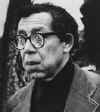
Click for a slightly larger image
![]()
Sonnet 18
by William Shakespeare
Shall I compare thee to a summer's day?
Thou art more lovely and more temperate.
Rough winds do shake the darling buds of May,
And summer's lease hath all too short a date.
Sometime too hot the eye of heaven shines,
And often is his gold complexion. dimmed;
And every fair from fair sometime declines,
By chance, or natures changing course, untrimmed;
But thy eternal summer shall not fade,
Nor lose possession of that fair thou ow'st,
Nor shall Death brag thou wand'rest in his shade.
When in eternal lines to time thou grow'st.
So long as men can breathe or eyes can see,
So long lives this, and this gives life to thee.
![]()
Sonnet 73
by William Shakespeare
That time of year thou mayst in me behold
When yellow leaves, or none, or few, do hang
Upon those boughs which shake against the cold,
Bare ruined choirs where late the sweet birds sang.
In me thou seest the twilight of such day
As after sunset fadeth in the west,
Which by and by black night doth take away,
Death's second self, that seals up all in rest.
In me thou seest the glowing of such fire
That on the ashes of his youth doth lie,
As the deathbed whereon it must expire,
Consumed with that which it was nourished by.
This thou perceiv'st, which makes thy love more strong,
To love that well which thou must leave ere long.
![]()
[l(a]
by e. e. cummings 1894-1962
l(a
le
af
fa
ll
s)
one
l
iness
For those without the patience to decipher this silly-looking piece, which is one of the best examples of concrete, or shaped, poetry;
It reads, "Loneliness . . . a leaf falls." . . . or better yet, "L(a leaf falls)onliness."

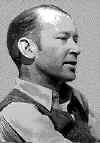
Click for a slightly larger image
![]()
To The States
by Walt Whitman — 1860, rev1881
To the states or any one of them, or any city of the States, Resist much, obey little,
Once unquestioning obedience, once fully enslaved,
Once fully enslaved, no-nation, state, city of this earth, ever afterward resumes its liberty.
![]()
Lying
by Jane Hirshfield — November 1994
He puts his brush to the canvas,
with one quick stroke
unfolds a bird from the sky.
Steps back, considers.
Takes pity.
Unfolds another.
![]()
Sea Fever
by John Masefield — 1899
I must go down to the seas again, to the lonely sea and the sky,
And all I ask is a tall ship and a star to steer her by,
And the wheel's kick and the wind's song and the white sail's shaking,
And the gray mist on the sea's face and a gray dawn breaking.
I must go down to the seas again, for the call of the running tide
Is a wild call and a clear call that may not be denied;
And all I ask is a windy day with the white clouds flying,
And the flung spray and the blown spume, and the sea-gulls crying.
I must go down to the seas again to the vagrant gypsy life.
To the gull's way and the whale's way where the wind's like whetted knife;
And all I ask is a merry yarn from a laughing fellow-rover,
And a quiet sleep and a sweet dream when the long trick's over.
![]()
Self Pity
by D. H. Lawrence —
I never saw a wild thing
sorry for itself.
A small bird will drop frozen dead from a bough
without ever having felt sorry for itself.
![]()
To Women, As Far As I'm Concerned
by D. H. Lawrence —
The feelings I don't have, I don't have.
The feelings I don't have, I won't say I have.
The feelings you say you have, you don't have.
The feelings you would like us both to have, we neither of us have.
The feelings people ought to have, they never have.
If people say they've got feelings, you may be pretty sure they haven't got them.
So if you want either of us to feel anything at all
You'd better abandon all idea of feelings altogether.
![]()
Fog
by Carl Sandburg —
The fog comes
on little cat feet.
It sits looking
over harbor and city
on silent haunches
and then moves on.
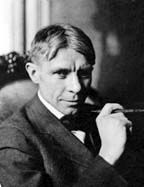
![]()
Lamentations
by Siegfried Sassoon —
I found him in the guard room at the base.
From the blind darkness I had heard his crying
And blundered in. With puzzled, patient face
A sergeant watched him; it was no good trying
To stop it; for he howled and beat his chest.
And, all because his brother had gone west,
Raved at the bleeding war, his rampant grief
Moaned, shouted, sobbed, and choked, while he was kneeling
Half naked on the floor. In my belief
Such men have lost all patriotic feeling.
![]()
V - The Soldier - from 1914
by Rupert Brooke —
If I should die, think only this of me:
That there is some corner of a foreign field
That is for ever England. There shall be
In that rich earth a richer dust concealed;
A dust whom England bore, shaped, made aware,
Gave, once, her flowers to love, her ways to roam,
A body of England's breathing English air,
Washed by the rivers, blest by suns of home.
And think, this heart, all evil shed away,
A pulse in the eternal mind, no less
Gives somewhere back the thoughts by England given;
Her sights and sounds; dreams happy as her day;
And laughter, learnt of friends; and gentleness,
In hearts at peace, under an English heaven.
![]()
Villanelle
by William Empson — 1935
It is the pain, it is the pain endures.
Your chemic beauty burned my muscles through.
Poise of my hands reminded me of yours.
What later purge from this deep toxin cures?
What kindness now could the old salve renew?
It is the pain, it is the pain endures.
The infection slept (custom or changes inures)
And when pain's secondary phase was due
Poise of my hands reminded me of yours.
How safe I felt, whom memory assures,
Rich that your grace safely by heart I knew.
It is the pain, it is the pain endures.
My stare drank deep beauty that still allures.
My heart pumps yet the poison draught of you.
Poise of my hands reminded me of yours.
You are still kind whom the same shape immures.
Kind and beyond adieu. We miss our cue.
It is the pain, it is the pain endures.
Poise of my hands reminded me of yours.

Click for a larger image
![]()
Sunday Morning
by Wallace Stevens —
1
Complacencies of the peignoir, and late
Coffee and oranges in a sunny chair,
And the green freedom of a cockatoo
Upon a rug mingle to dissipate
The holy hush of ancient sacrifice.
She dreams a little, and she feels the dark
Encroachment of that old catastrophe,
As a calm darkens among water-lights.
The pungent oranges and bright, green wings
Seem things in some procession of the dead,
Winding across wide water, without sound.
The day is like wide water, without sound,
Stilled for the passion of her dreaming feet
Over the seas, to silent Palestine,
Dominion of the blood and sepulcher.
2
Why should she give her bounty to the dead?
What is divinity if it can come
Only in silent shadows and in dreams?
Shall she not find in the comforts of sun,
In pungent fruit and bright, green wings, or else
In any balm or beauty of the earth,
Things to be cherished like the thought of heaven?
Divinity must live within herself:
Passions of rain, or moods in falling snow;
Grievings in loneliness, or unsubdued
Elations when the forest blooms; gusty
Emotions on wet roads on autumn nights;
All pleasures and all pains, remembering
The bough of summer and the winter branch.
These are the measures destined for her soul.
3
Jove in the clouds had his inhuman birth.
No mother suckled him, no sweet land gave
Large-mannered motions to his mythy mind
He moved among us, as a muttering king,
Magnificent, would move among his hinds,
Until our blood, commingling, virginal,
With heaven, brought such requital to desire
The very hinds discerned it, in a star.
Shall our blood fail? Or shall it come to be
The blood of paradise? And shall the earth
Seem all of paradise that we shall know?
The sky will be much friendlier then than now,
A part of labor and a part of pain,
And next in glory to enduring love,
Not this dividing and indifferent blue.
4
She says, "I am content when wakened birds,
Before they fly, test the reality
Of misty fields, by their sweet questionings;
But when the birds are gone, and their warm fields
Return no more, where, then, is paradise?"
There is not any haunt of prophecy,
Nor any old chimera of the grave,
Neither the golden underground, nor isle
Melodious, where spirits gat them home,
Nor visionary south, nor cloudy palm
Remote as heaven's hill, that has endured
As April's green endures; or will endure
Like her remembrance of awakened birds,
Or her desire for June and evening, tipped
By the consummation of the swallow's wings.
5
She says, "But in contentment I still feel
The need of some imperishable bliss."
Death is the mother of beauty; hence from her,
Alone, shall come fulfillment to our dreams
And our desires. Although she strews the leaves
Of sure obliteration on our paths,
The path sick sorrow took, the many paths
Where triumph rang its brassy phrase, or love
hispered a little out of tenderness,
She makes the willow shiver in the sun
For maidens who were wont to sit and gaze
Upon the grass, relinquished to their feet.
She causes boys to pile new plums and pears
On disregarded plate. The maidens taste
And stray impassioned in the littering leaves.
6
Is there no change of death in paradise?
Does ripe fruit never fall? Or do the boughs
Hang always heavy in that perfect sky,
Unchanging, yet so like our perishing earth,
With rivers like our own that seek for seas
They never find, the same receding shores
That never touch with inarticulate pang?
Why set the pear upon those river-banks
Or spice the shores with odors of the plum?
Alas, that they should wear our colors there,
The silken weavings of our afternoons,
And pick the strings of our insipid lutes!
Death is the mother of beauty, mystical,
Within whose burning bosom we devise
Our earthly mothers waiting, sleeplessly.
7
Supple and turbulent, a ring of men
Shall chant in orgy on a summer morn
Their boisterous devotion to the sun,
Not as a god, but as a god might be,
Naked among them, like a savage source.
Their chant shall be a chant of paradise,
Out of their blood, returning to the sky;
And in their chant shall enter, voice by voice,
The windy lake wherein their lord delights,
The trees, like seraphim, and echoing hills,
That choir among themselves long afterward.
They shall know well the heavenly fellowship
Of men that perish and of summer morn.
And whence they came and whither they shall go
The dew upon their feet shall manifest.
8
She hears, upon that water without sound,
A voice that cries, "The tomb in Palestine
Is not the porch of spirits lingering.
It is the grave of Jesus, where he lay."
We live in an old chaos of the sun,
Or old dependency of day and night,
Or island solitude, unsponsored, free,
Of that wide water, inescapable.
Deer walk upon our mountains, and the quail
Whistle about us their spontaneous cries;
Sweet berries ripen in the wilderness;
And, in the isolation of the sky,
At evening, casual flocks of pigeons make
Ambiguous undulations as they sink,
Downward to darkness, on extended wings.

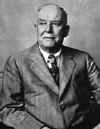
Click for a slightly larger image
![]()
This Is Just to Say
by William Carlos Williams -1962
I have eaten
the plums
that were in
the icebox
and which
you were probably
saving
for breakfast
Forgive me
they were delicious
so sweet
and so cold
